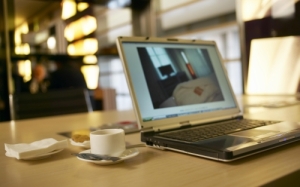Tag Archives: Wireless
Hospitality Industry Technology Solutions: “Top 5 Trends In Hotel Technology” Feature Importance Of “Electronic Device Support” And “Real-Time Online Pricing & Reservations”
Comments Off on Hospitality Industry Technology Solutions: “Top 5 Trends In Hotel Technology” Feature Importance Of “Electronic Device Support” And “Real-Time Online Pricing & Reservations”
December 1, 2013 · 9:35 amHospitality Industry Wireless Technology: Hotels Offered Free Wi-Fi At 64% Of Properties In 2013 With Guests Expecting Speeds Up To 5 Mbps
Comments Off on Hospitality Industry Wireless Technology: Hotels Offered Free Wi-Fi At 64% Of Properties In 2013 With Guests Expecting Speeds Up To 5 Mbps
November 16, 2013 · 11:34 amHospitality Industry Information Security: Study Finds Hotels Are "Prime Targets" For Financial Data Theft; "Infiltration Of Smartphones Through Bluetooth Technology"
“…Hotels also are prime targets for people looking to steal financial data. In a study of 200 data-breach cases,  Trustwave’s SpiderLabs, the online security company’s research arm, found 38 percent occurred at hotels or resorts…”
Trustwave’s SpiderLabs, the online security company’s research arm, found 38 percent occurred at hotels or resorts…”
Two key challenges for travelers involve the use of unsecured wireless networks at hotels, airports and other public venues and the infiltration of smartphones through Bluetooth technology.
Identity theft can be a rude awakening for many business travelers. Last year, identity theft made up 19 percent of the 1.3 million complaints stored in the Consumer Sentinel Network, a secure online database available to law-enforcement agencies.
Experts say business travelers are especially vulnerable because they increasingly rely on electronic devices that easily can be lost or hacked. Credant Technologies, a data-protection company, found that travelers have lost 11,000 mobile devices at the busiest U.S. airports this year, 37.5 percent of them laptops and 37.2 percent tablets or smartphones.
“You are 15 times more likely to have your identity stolen than to have your car broken into,” said Todd Davis, chairman and CEO of LifeLock, an identity-theft protection company.
Filed under Crime, Guest Issues, Liability, Management And Ownership, Privacy, Risk Management, Technology, Theft
Hospitality Industry Privacy Risks: Mobile Phone Carriers Confirm That Mobile Devices "Integrate Tracking Software" That Reveals User's Location
“…AT&T, Sprint, HTC, and Samsung today confirmed that their mobile phones integrate a controversial piece of tracking software from a company called Carrier IQ..”
“…the software can be tweaked to gather more intrusive data about a user’s location, the software and applications on the device, which keys are being pressed and what applications are in use…”
[youtube=http://www.youtube.com/watch?v=T17XQI_AYNo]
Both wireless carriers AT&T and Sprint insisted that the software is being used solely to improve wireless network performance while phone makers HTC and Samsung said they were integrating the software into their handsets only because their carrier customers were asking for it.
Meanwhile, several large carriers and handset makers, including Verizon, Research In Motion, and Nokia, distanced themselves from the software and insisted that reports about their devices integrating the tool are false.
The controversy began last week when independent security researcher Trevor Eckhart published a report disclosing how Carrier IQ’s software could be used by carriers and device makers to conduct surreptitious and highly intrusive tracking of Android and other smartphone users.
Eckhart described the software as a hard-to-detect and equally hard-to-remove rootkit that could be used by carriers and phone makers to collect almost any kind of data from a mobile phone without the user’s knowledge. Eckhart said his research showed that Carrier IQ’s software was often enabled to run by default on several mobile devices including those from Samsung, HTC, RIM, and others.
A lot of the information collected by Carrier IQ is designed to enable mobile operators and device vendors to quickly identify and address quality and service-related issues.
Comments Off on Hospitality Industry Privacy Risks: Mobile Phone Carriers Confirm That Mobile Devices "Integrate Tracking Software" That Reveals User's Location
Filed under Guest Issues, Liability, Management And Ownership, Privacy, Risk Management, Technology
Hospitality Industry Internet Issues: Hotel "Wi-Fi Networks" Are Facing "Exponentially" Higher Demand From Guest Usage Of iPads; Investment In More Bandwidth Necessary
“…Some hotel Internet service providers are proposing a solution that offers tiered Wi-Fi service. The lowest level, suitable for basic Internet requirements like checking e-mail, would be free, but other levels would be priced depending on bandwidth requirements…”
 Â “… iPads consume four times more Wi-Fi data per month than the average smartphone…”
 “… iPads consume four times more Wi-Fi data per month than the average smartphone…”
Largely because of the broad use of iPads and other mobile tablets, which are heavy users of video streaming, the guest room Wi-Fi networks that most hotels thought they had brought up to standard just a few years ago are now often groaning under user demands.
“The iPad is the fastest-selling device in consumer electronics history, and because of it the demand placed on any public place Wi-Fi system has gone up exponentially in the last year and a half,†said David W. Garrison, the chief executive of iBAHN, a provider of systems for the hotel and meetings industries.
This means more hotel customers are unhappy with their Internet connections. Hotel owners, meanwhile, who are digging out from a two-year slump caused by the recession, will probably have to invest more money to provide more bandwidth.
For travelers, it may mean still another fee, since hotels will be paying their own Internet bills.
Comments Off on Hospitality Industry Internet Issues: Hotel "Wi-Fi Networks" Are Facing "Exponentially" Higher Demand From Guest Usage Of iPads; Investment In More Bandwidth Necessary
Filed under Guest Issues, Maintenance, Management And Ownership, Technology
Hospitality Industry Cybercrime Risks: Hotel Management Should Have Policies "Disclosing Risks Of Hotel Computer And Wireless Internet Usage"
“…According to a report from antivirus software manufacturer Norton, global cybercrime has claimed 431 million adult victims in the past year, costing countries $114 billion in direct financial losses. That figure jumps to  $388 billion when you factor in the value that victims place on the time they spent recouping the losses…”
$388 billion when you factor in the value that victims place on the time they spent recouping the losses…”
Last year, in the U.S. specifically, more than 74 million people were victims of some form of cybercrime, leading to $32 billion in direct financial losses.
-
Recognize that your smartphone is really a pocket-size computer and is prone to the same types of attacks directed at your laptop and desktop. Take steps to protect it, such as keeping your operating system current and creating a strong password.
-
Keep your personal information to yourself. For instance, don’t put your entire birth date, including the year, on Facebook. Think about the security questions normally posed by your bank and other secure locations: “first school you attended,” “name of favorite pet” and the like. Are your answers on display online?
-
Know the pitfalls of public Wi-Fi. CreditCards.com says, “Avoid public wireless Internet connections unless you have beefed-up security protection.”
-
Beware of public computers, too. For instance, Kiplinger says, “Don’t access your accounts or personal information on public hotel computers, which could have software that logs keystrokes and records your passwords and account numbers.”
-
Use credit cards, rather than debit cards, when making purchases online. In case of fraud, you’ll get much better protection from liability with a credit card.
For more:Â http://money.msn.com/identity-theft/article.aspx?post=6730f6ce-5203-4b59-bd46-f65a7a3545c2
Comments Off on Hospitality Industry Cybercrime Risks: Hotel Management Should Have Policies "Disclosing Risks Of Hotel Computer And Wireless Internet Usage"
Filed under Guest Issues, Liability, Management And Ownership, Privacy, Risk Management, Technology, Theft
Hospitality Industry Technology Issues: Hotel Management Will Feel Increased Pressure In 2011 To Offer "Free Wireless Internet Access" With Resultant Needs To Secure Network
A comfy mattress and a hot breakfast are still important to hotel guests, but free wireless Internet access is the most desired amenity, according to a new survey of 53,000 travelers.
 Hotels are likely to feel more pressure to offer the service at no charge, said Stuart Greif, vice president and general manager of the global travel and hospitality practice at J.D. Power.
Hotels are likely to feel more pressure to offer the service at no charge, said Stuart Greif, vice president and general manager of the global travel and hospitality practice at J.D. Power.
The survey by J.D. Power & Associates found that free Wi-Fi was the most important feature for guests in nearly every segment of the hotel industry.
-
The most expensive hotels were the least likely to offer free Wi-Fi.
-
Of guests staying at midscale hotels, 96 percent said they got free Wi-Fi, as did 64 percent of guests at budget hotels, according to the survey of guests who stayed in hotels from May 2009 to June 2010.
-
None said they got free Wi-Fi at luxury hotels.
-
 Free Wi-Fi is available at many businesses.
At the Ritz-Carlton luxury hotel chain, the fee for Wi-Fi access is a top complaint among guests, said spokeswoman Vivian A. Deuschl. (The new Ritz-Carlton in downtown Los Angeles charges $12.95 a day.) Some Ritz-Carlton hotels offer free Internet access in the lobbies and other public spaces. “We have no immediate plans to change the policy, but it’s an ongoing subject of discussion,” Deuschl said.
Filed under Guest Issues, Management And Ownership, Risk Management
Hospitality Industry Internet Security Risks: Hotels Can Offer Wireless Internet With WPA2 (Wi-Fi Protected Access 2) To Offer Guests Greatest Wireless Security
IS WIRELESS INTERNET IN HOTELS SAFE?
- The short answer is: No. Wi-Fi was born to be convenient, not secure. Unsecured, unprotected wireless is everywhere. When a device connects to unprotected Wi-Fi, all the
 data stored on that device is available to a hacker with the proper sniffing tools.
data stored on that device is available to a hacker with the proper sniffing tools. - The longer answer is: It depends on what kind of wireless that is provided.
- Free, unsecured Wi-Fi is the least secure. Any Wi-Fi connection, whether in public, at home, or in the office, that is shared with anyone with any wireless device, lacks encryption of the data packets streaming from the connected devices.
- A simple Firefox add-on called Firesheep can allow anyone with a Firefox browser to sniff out other devices using the same Internet connection, and to spy on their browser activity. Even if the victim’s login is encrypted, once they visit an unencrypted site, their data becomes vulnerable.
- Wi-Fi with a WEP encryption is slightly more secure. Wired Equivalent Privacy was introduced in 1997 and is the original version of wireless network security. But WEP has been cracked, hacked, and decimated.
- Wi-Fi with a WPA encryption is better. Wi-Fi Protected Access is a certification program that was created in response to several serious weaknesses researchers found in WEP, the previous system. WPA and WPA2 are tougher to crack, but not impossible.
- Mobile Broadband has a degree of encryption that has been cracked, but the necessary hardware isn’t widely deployed by criminals. Researchers have demonstrated how the system can be hacked, but it’s still more secure than other options.
- WPA2 Wireless Internet IS THE MOST SECUREÂ
For more:Â http://advice.cio.com/robertsiciliano/14923/hacking_wireless_for_identity_theft
Comments Off on Hospitality Industry Internet Security Risks: Hotels Can Offer Wireless Internet With WPA2 (Wi-Fi Protected Access 2) To Offer Guests Greatest Wireless Security
Filed under Guest Issues, Management And Ownership, Risk Management, Technology, Theft
Hospitality Industry Guest Service Issues: Hotels Are Under Pressure To Deliver High-Speed, Cost-Effective Wireless To Guests Who Want To Access It Everywhere (Video)
[youtube=http://www.youtube.com/watch?v=kdGJ4uIIEp4]
Comments Off on Hospitality Industry Guest Service Issues: Hotels Are Under Pressure To Deliver High-Speed, Cost-Effective Wireless To Guests Who Want To Access It Everywhere (Video)
Filed under Guest Issues, Maintenance, Management And Ownership, Privacy, Technology, Training



